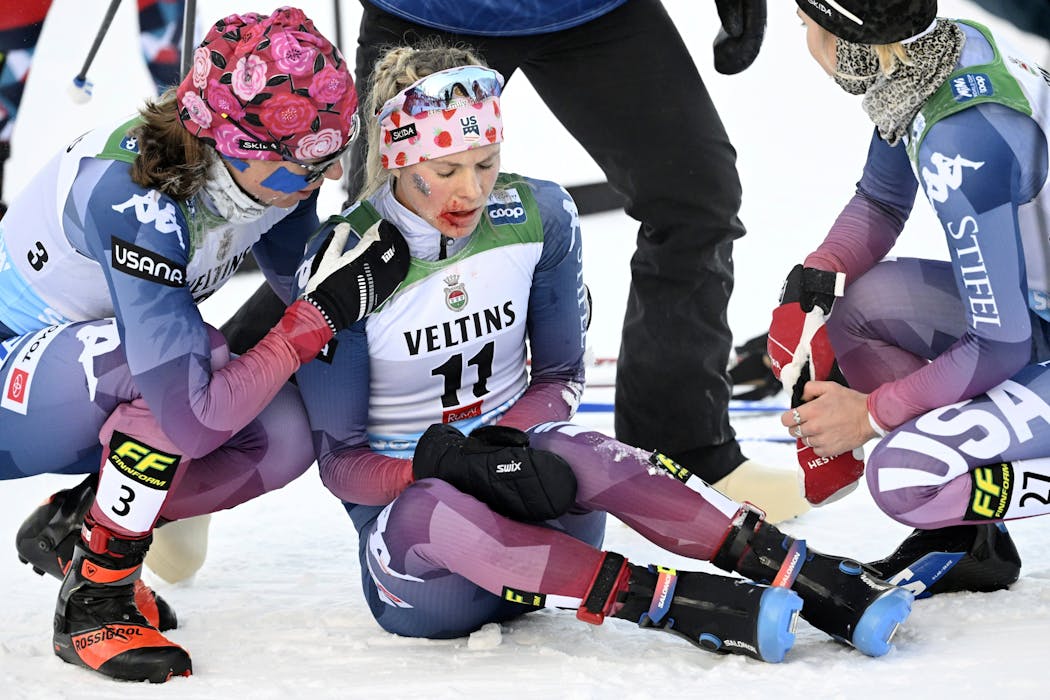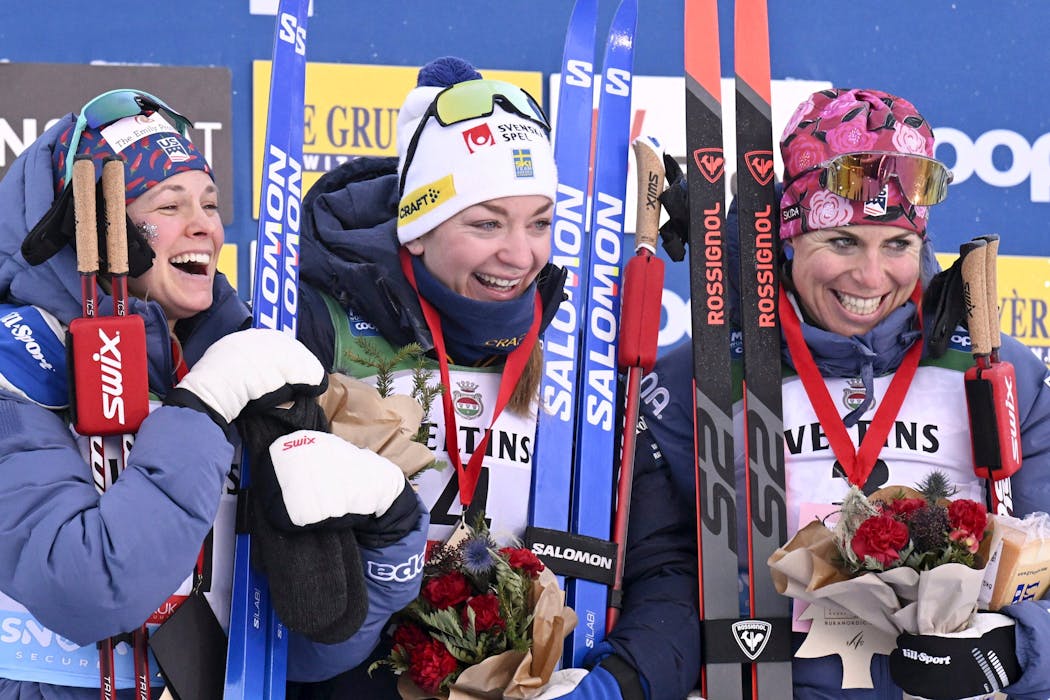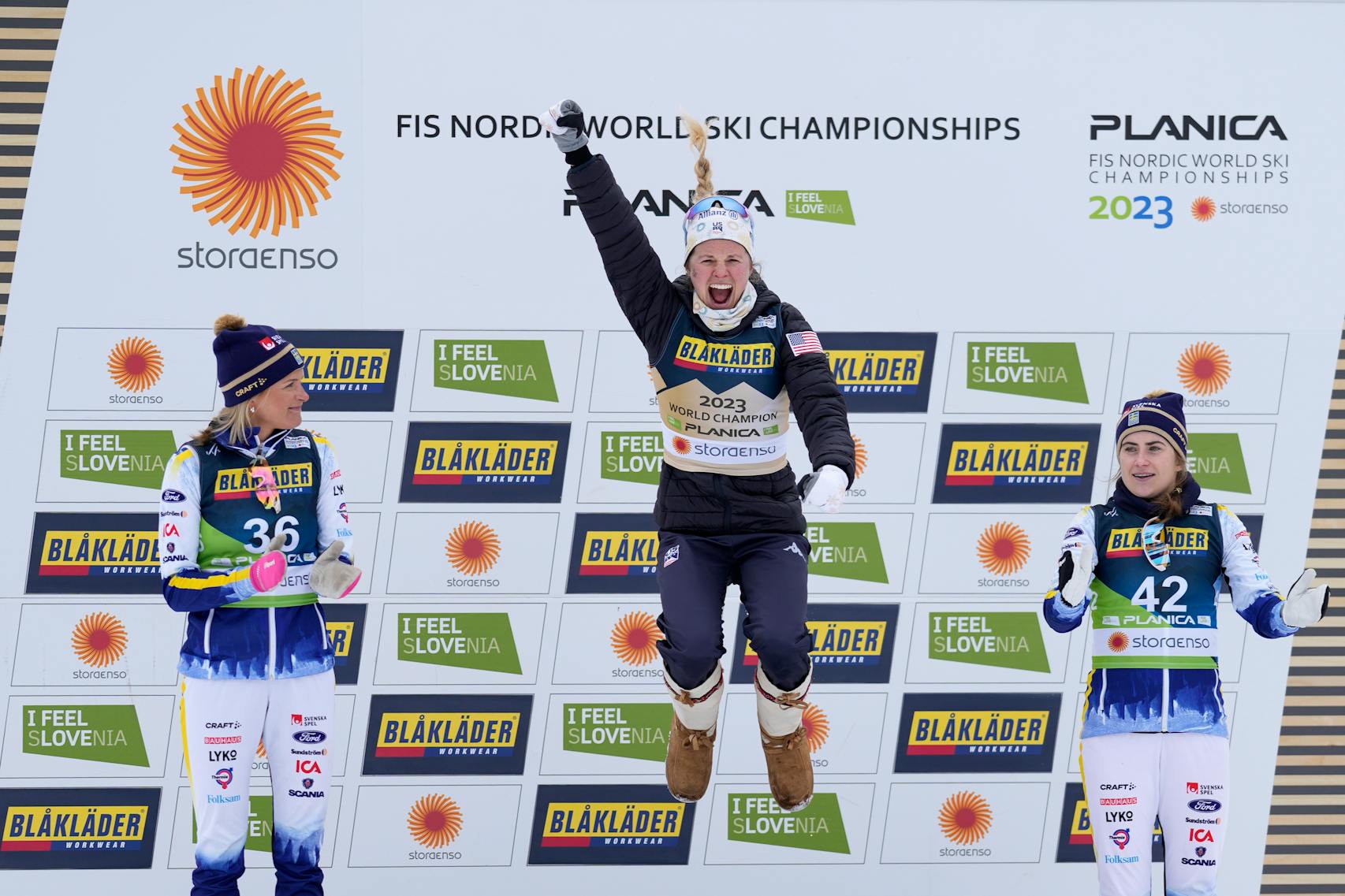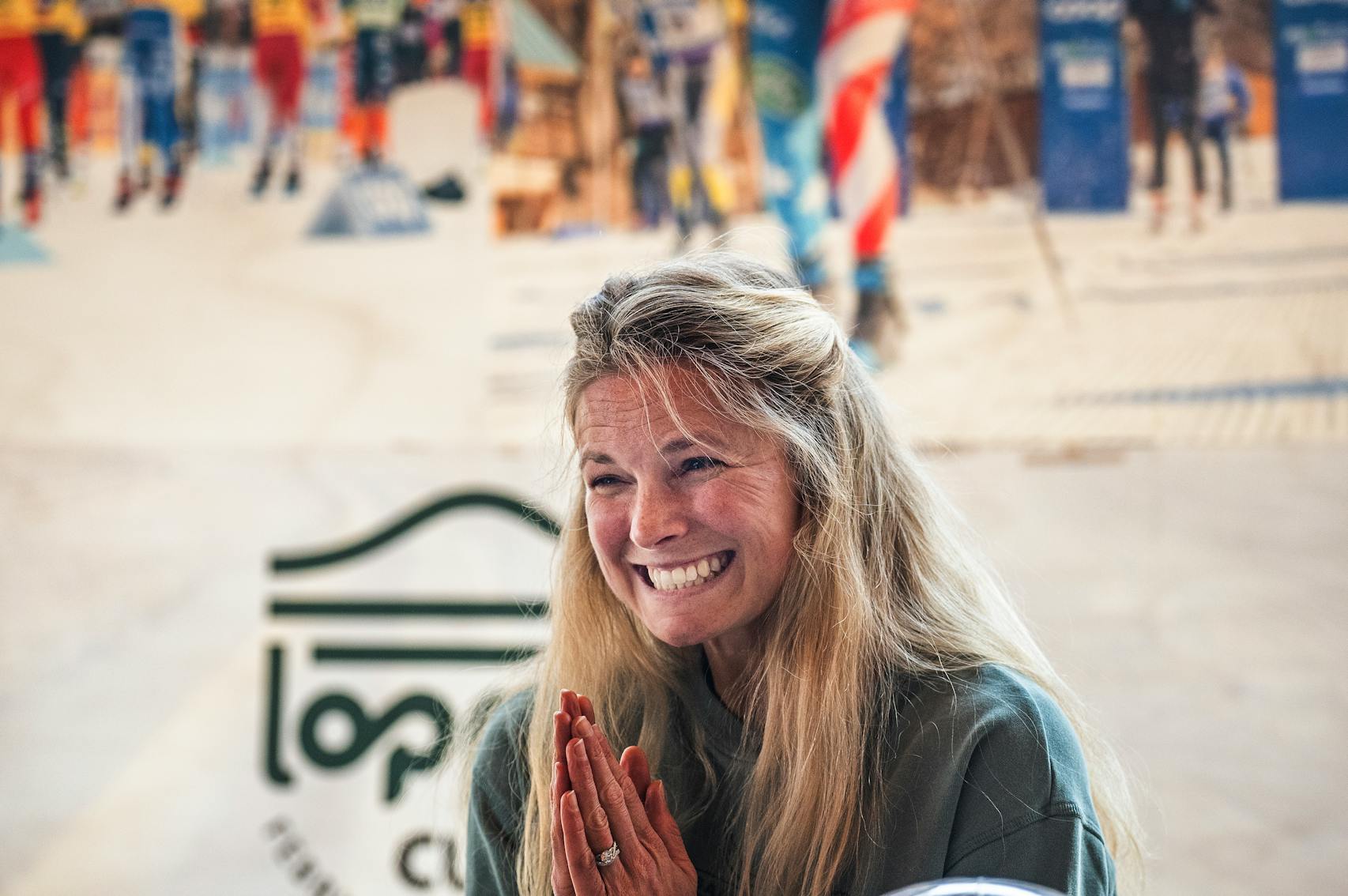Related content
f you measure strictly by results and records, the defining moment of Jessie Diggins' year came last spring. At the world championships, she reached the podium twice, winning gold and bronze medals in another history-making performance for U.S. cross-country skiing.
But that doesn't convey the full scope of what the Afton native pulled off in 2023. To understand that, you have to turn to Thanksgiving weekend in Ruka, Finland, to a 20-kilometer race on the third day of this World Cup season.
Diggins wasn't even sure she would start; after a relapse of her eating disorder last summer, she was taking things day by day. Yet she decided to race and was among the leaders with 1 ½ kilometers left. Then someone stepped on her ski pole, ripping it — and her glove — from her right hand. A coach reached out with a replacement pole, which smashed her in the mouth and split open her lip.
Blood spread across her face. The pole she got wasn't the right kind. Her competitors were speeding past her, and she worried her hand would freeze in the 4-degree cold.
When she crossed the finish line, Diggins was so dazed she couldn't remember what happened. Before she knew it, she was accepting a check and a big wedge of Gruyère cheese for finishing second, only three-tenths of a second behind the winner.
"Even when things don't go perfectly, you can sometimes find a way to make it happen," Diggins said later, in a Zoom interview from Norway. "Sometimes, you can't, and that's OK. But the one thing I can't do is give up."
That statement could be her life's motto. It certainly sums up her year, a 12-month run of triumph, courage, history and inspiration that made her the Star Tribune's choice as its 2023 Sportsperson of the Year.
Last summer, as she wrestled anew with the eating disorder, Diggins considered stepping away from a sport that's taken her from Minnesota's snowy trails to three Olympics. She chose to keep forging ahead.
Diggins went public with the news of her relapse, hoping her story might help others. She plunged back into competition, despite her fears about how well she would do.
None of that could slow her down. Diggins topped off 2023 by winning two 10k races by wide margins in the two weekends after the drama at Ruka, racking up the best early-season results of her career. She's competed in all 10 events thus far, making the podium five times and placing in the top 11 in every race.
"If it were anyone else, that might be a surprise," said Alayna Sonnesyn of Plymouth, Diggins' teammate on the World Cup circuit. "But we all know how strong Jessie is. There is no one else like her."
Diggins proved that again this year. At the world championships in February, she won the 10k freestyle, becoming the first American to capture a world title in an individual cross-country race. In March, she placed third in the inaugural 50k World Cup race for women, an event she had championed for years in the name of gender equality.
She finished second in the 2022-23 World Cup overall standings, with eight top-three finishes and a career-high 1,867 points. After it ended, Diggins came to Minneapolis to promote this February's World Cup races at Wirth Park, an event that will check off another of her longtime goals.
In short, it was another year of firsts and onlys and bests and mosts. While it seems almost unfathomable that she raised the bar again in 2023, Diggins is used to doing things that haven't been done before.
"There were some times last summer when I thought about, I could just be done," she said. "I don't have to put my body through this anymore. And that would be fine. I've done a lot that I wanted to do in the sport.
"But I feel like I'm not done trying to reach my potential. I feel like I'm still growing every year, still learning and working on things. And I have a big list of things."
'Letting myself celebrate'
Diggins, 32, has brought the U.S. three Olympic medals and six world championship medals — the most of any U.S. cross-country skier in history. She's also the first American woman to win a World Cup overall title and the first to win the circuit's distance championship.
She and Kikkan Randall became the first Americans to win Olympic gold in their sport when they captured the team sprint at the 2018 Winter Games. This year, Diggins reached 16 career World Cup victories, another U.S. record.
"I'm honestly not sure how she does it," coach Jason Cork said. "Ultimately, she just holds herself to really high standards. She's really comfortable being uncomfortable, and she insists on having fun."
Diggins' year hit an early peak at the world championships in Planica, Slovenia. She cried happy tears after the team sprint, when she won a bronze medal alongside teammate Julia Kern, her best friend. Two days later, she carried heavier emotions into the 10k.
A grueling training block made Diggins nervous about whether she would be at peak fitness, and she bore the pressure of being a favorite. She responded with an effort she called one of the best races of her life. Armed with perfect skis, on a tough course that suited her well, Diggins beat Sweden's Frida Karlsson by 14 seconds.
She surprised herself with what happened next. Instead of instantly shifting her focus to the next race, as she usually does, Diggins joined the wax technicians in their truck for celebratory drinks and songs.
"That was the very coolest part, letting myself celebrate it," she said. "I think I'm finally reaching a point in my career where I'm realizing this is incredibly hard to do. And when you have a day when it all comes together, and you're the best in the world, you'd better enjoy it."
Last summer, Diggins began to think less about enjoying those moments and more about repeating them. She fell back into a dangerous habit of believing she had to be unfailingly perfect, which led to the return of her eating disorder.
Several years ago, Diggins was treated for bulimia through the Emily Program, a Twin Cities-based organization. It gave her greater insight into mental health, teaching her that the disorder wasn't her fault and couldn't simply be willed away. During that time, Diggins began assembling a safety net of people she could call on for help.
It was "pretty scary," she said, to open up to her teammates with the Stratton Mountain School elite club, the first people she told. They responded with unconditional love. Soon, Diggins was being lifted up by the entire safety net.
"It was honestly kind of hard to realize this is something that's going to be part of my brain for the rest of my life," Diggins said. "And I need to find better coping mechanisms for dealing with stress and pressure and perfectionism.
"It's something a lot of athletes struggle with, this question of, 'Will you love me if I don't win?' You're always told, 'I cheer for you. I hope you win.' It's easy to internalize that and think, maybe that's where my worth lies. I had to zoom out and see the bigger picture."
Over the past several months, Diggins has leaned on coaches, sports psychologists, teammates, friends and family. She said their ongoing support has been crucial to getting her back to World Cup racing, and the feeling of empowerment has contributed to her strong start this season.
She's also shared her struggles more widely, in social media posts and interviews. While it made her feel vulnerable, Diggins said, she believed talking about her situation could help break down the stigma around mental health and give hope to others with eating disorders.
Jillian Lampert, chief strategy officer of the Emily Program, said Diggins' story is "a light in the darkness" that can help others see what recovery looks like. Her teammate Sonnesyn viewed it as the most impressive thing Diggins did this year.
"So many of her race results were amazing," Sonnesyn said. "But at the end of the day, it's about what you're doing to inspire others. And Jessie used her own challenges to inspire people and set an example that it's OK to ask for help. That takes courage."
Back on top
Diggins' fearlessness is a huge part of who she is. She often talks about the "pain cave," that point in every race when her lungs burn and her muscles strain to the verge of collapse. To Diggins, that is something to relish, a way to test her fortitude and expand her limits.
After conquering her anxiety about disclosing her relapse, she faced another source of worry. Last summer, while Diggins prioritized her mental health, she didn't pour herself into offseason training as fully as usual. She believed that was the right thing to do, but it left her concerned about how it would affect her racing.
That uncertainty was nerve-racking, Diggins said. She downplayed expectations before the season-opening weekend in Ruka, telling media her race schedule would be determined on a daily basis.
Still, she tackled all three races at the opener, placing seventh in a classic sprint and 11th in a classic 10k. The 20k was a freestyle, her favored racing style, covering eight laps on a hilly course. She was sitting in third place when the pole was yanked from her hand; without it, she dropped back to midpack, with little time left to make up that lost ground.
"Most people would have wilted, but not Jessie," said Chad Salmela, part of the U.S. broadcast team for World Cup races. "I didn't think she'd get to the podium after that happened. The way she got that second place was remarkable."
Diggins told herself she had nothing to lose. She raced hard and smart, taking some tactical risks that paid off, picking her way through the field. Though she closed in on leader Moa Ilar of Sweden, Ilar had enough left to outsprint Diggins for the narrow win.
After the race, Diggins wrote on Instagram that she "had to get gritty as all hell" to reach the podium. The effort proved she was in good shape, giving her confidence going into a 10k freestyle — her best event — the following weekend in Gällivare, Sweden.
She won by 23.1 seconds, a monster margin. The next day, Diggins powered the U.S. to third in a relay, then smoked another 10k freestyle field with a 23-second victory a week later in Östersund, Sweden.
In a year like this, Salmela said, it can feel like Diggins is "almost superhuman." The way she sees it, the past 12 months simply gave her opportunities to try to be the best human she can be. Diggins stood up to challenges, leaned on others, lent a hand, explored what was possible and found happiness wherever she could.
The results and the records were nice, but that's not what she'll remember.
"Last summer, something I thought a lot about was, does this still bring me joy?" she said. "Do I still feel passionate about it? And the answer was yes.
"What's important is to focus on the things that are meaningful to me. And I'm not done yet."






